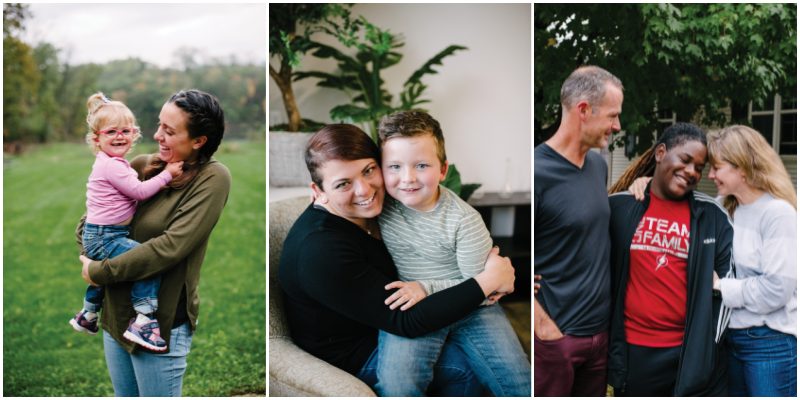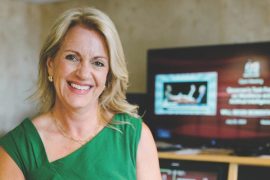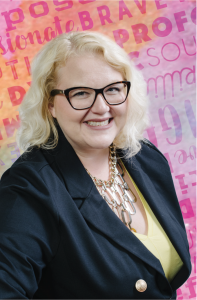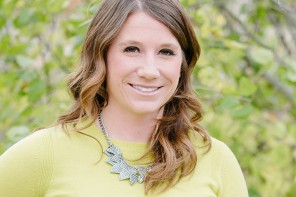By Hannah Wente | Photography by Hillary Schave
Preparing to have a baby does not always include preparing to have a child with disabilities. According to the 2019 American Community Survey (the most recent figure available), 4.3% of the U.S. population under 18 years old has a disability. Once a parent learns their child has a disability, extra care and vigilance supports and nurtures the child as they navigate life.
Several area families let us into their world of what it’s like to have a differently-abled child — and how their kids are learning to adapt to their disabilities by making time for the activities they love.
Mia Theo, 2 1⁄2 Years Old
Without her hearing aids, glasses and walker, Mia Theo looks like a typical toddler. However, she was born with benign congenital hypotonia, a neuromuscular disease that causes low muscle tone and impacts oral motor skills (such as eating), walking and overall development. She also has vision and hearing loss that aren’t related to hypotonia.
“It was just kind of thrown to us out of the blue,” says Mia’s mother, Aimee Theo. “We had no idea when I was pregnant or even right away after she was born. I didn’t know right away that anything was wrong.”
Mia was diagnosed during her stay in the neonatal intensive care unit (NICU) right after birth. The family still does not know why Mia was born with the condition.
“It doesn’t really matter now, if we were prepared or not,” Aimee says. “I don’t know if it would have been better to know [before she was born]; I feel like maybe I would have worried more. And also kind of like, ‘What happened?’ Trying to explain [the disease] to people has been really challenging … and trying to understand it myself.”
When Mia was first diagnosed, Aimee and her husband, Michael, sought out support from parent groups. Wisconsin Sound Beginnings offers monthly virtual meetings on different topics related to hearing loss. The group also provides American Sign Language (ASL) support. Mia participates in the Birth to 3 program (see sidebar) and has a Childhood Long-Term Support (CLTS) Program case manager that links her with the resources she needs. The CLTS Program provides funding and support for families who are Medicaid eligible and have children with disabilities. This allows families to care for their children at home and participate in their communities, according to Family Voices of Wisconsin, an organization that helps families with special-needs kids navigate health care needs and community services.
The family also takes Mia to Gio’s Garden in Middleton, which offers respite therapy for families of children with disabilities, for three to four hours twice a week. Whether people need a few hours a week to attend a sibling’s soccer game, clean the house in peace, run errands or take a nap, Gio’s offers on-site care and therapy for youth with disabilities through age 6.
“Every parent needs extra help and extra support,” says Gio’s Garden executive director Geof Brown. “The respite break is super important because the parents are at work, then they come home, and they’re trying to be a fun and loving parent, making sure their kid is happy. But they’re also thinking, ‘Did they get their meds at the right time; are they eating the way they should be eating; is their feeding tube working? Do I have the medical supplies I need?’ These parents are managing so much more than the average parent.”
Mia has attended Gio’s Garden since she was about six months old. The staff takes her on field trips and helps with feeding strategies. Aimee and Michael started taking her there so they could spend more one-on-one time with their son Andreas, age 4. It provides respite not only for the immediate family, but for the extended family caregivers as well. And, it allows Mia to connect with people beyond her family circle.
“They [Gio’s Garden staff and clients] are her people,” Aimee says. “She has such a big smile when she arrives.”
Mia also does weekly equine therapy at Natural Wisdom Counseling in Mount Horeb, which has been critical to the health and wellbeing of both her and her family. Aimee says the therapy has increased Mia’s confidence and calls the farm her “happy place.” The equine therapy helps Mia build her muscle tone, strength and muscle control. Having stronger muscles is critical to improving her ability to walk, sit and stand without assistive devices like wheelchairs and walkers in the long-term. Staff there are fluent in ASL and they provide emotional support for parents as well as tips on how to navigate behavioral concerns.
“Our kids are so much stronger than we give them credit for,” says Aimee. “I call her [Mia] tenacious — she’s stubborn and hardheaded, and she thinks she can do a lot more than her body will allow her to, but she will not let that hold her back.”
What is Hypotonia?
According to the American Academy of Pediatrics, hypotonia causes low muscle tone and postural instability, meaning a child has difficulty sitting, standing and walking. It is typically detected at birth or when a child is very young, and often requires use of a walker or wheelchair as they grow. Hypotonia is a lifelong condition; however, therapy can help a child build muscle tone and adapt to the disease for the long-term.
Birth to 3 Program
The Birth to 3 Program is an early intervention program for children with developmental delays or disabilities under the age of three, run by the Wisconsin Department of Health Services.
Hugh Davis is the executive director of Wisconsin Family Ties, a nonprofit organization that provides family support for parents of children who have social, emotional, behavioral or mental health challenges. He knows the power of early intervention. His fourth child was missing development milestones, and after struggling to find services for their other child, they knew they needed to get him into the Birth to 3 program for occupational, physical and speech therapy.
Around the time he turned three, Davis says his son started talking in full, unique sentences — before he would repeat phrases or sentences he’d already heard — and was able to attend school without additional services. Davis hopes his experience as a parent can provide support and hope to others.
“We’ve stumbled through all of these things so we can help parents understand what their options are and what they can advocate for their kids.”
Learn more about the Birth to 3 Program at dhs.wisconsin.gov/birthto3. Find out what Wisconsin Family Ties offers at wifamilyties.org.
Rourke Kasper, 6 Years Old
Rourke Kasper is a kindergartener and a fan of all things math, science and space. The lively 6-year-old was also diagnosed as being on the autism spectrum, or as neurologically diverse, by staff at the Waisman Center. The center has an Autism and Developmental Disabilities Clinic that works with families on diagnosing autism and other genetic disorders, as well as provides therapeutic services.
The term “neurologically diverse” recognizes that it’s normal for people’s brains to operate differently. Use of the term began in 1998 with the goal of reducing the stigma around autism by acknowledging there are differences in how people learn and think.
In general, Rourke’s mom, Michelle Kasper, says her son appears neurotypical (which means he doesn’t outwardly display many signs of autism). For example, he can maintain eye contact and he’s very verbal. So when some of his autism symptoms show up, she says outsiders are confused by it — and their initial reaction is that he’s misbehaving or out of control. To this day, family and friends still tell Michelle that they think there’s nothing “wrong” with her son.
Abrupt changes in his behavior and an inability to communicate his needs led Michelle and her husband, Bill, to have Rourke evaluated.
Getting Rourke diagnosed took months, and it took Michelle a full year to accept that her son was neurologically diverse. She thought that intensive therapy would “fix” him and everything would be “OK.” But after a year, she realized her son was unique and different — and that was fine.
She equates raising a child with a disability as preparing for a vacation only to find you’ve landed in the wrong country. You’ve read all of the travel books, learned Spanish and studied a map of Spain, but suddenly you’re in Italy.
“There wasn’t a book or roadmap telling us what to do,” says Michelle. “It was us fumbling around until we learned about the Katie Beckett Program and the CLTS [Program].”
Both programs provide funding and support for families. The Katie Beckett Program, also known as Katie Beckett Medicaid, allows children living at home with long-term disabilities, mental illness or complex medical needs, to purchase medically-necessary equipment and services allowed under the Medicaid program. Children who do not qualify for Medicaid may qualify for the Katie Beckett Program, according to the Wisconsin Department of Health Services. Michelle says caseworker Rebecca Uselman with the CLTS Program was the first person in over two years of navigating the special-needs system who asked her what her son and family needed.
“It was the first time I felt like someone was supporting us as a whole family,” she says.
Getting the support Rourke needed within the public school system was a different story.
“The biggest struggle we had was with the public education system,” says Michelle. “There’s a huge discrepancy between what is required to have a diagnosis of autism medically, and then what the school district sees as what qualifies a student for services. [And], every day of our life we are confronted with a new thing that we didn’t prepare for, whether it’s behavior aggression or a new behavior that’s unacceptable at school.”
Despite a diagnosis and prescribed therapy from the Waisman Center, a pediatrician and independent evaluator, it was impossible to get in-school services, according to Michelle.
Public schools in the U.S. are required by the Individuals with Disabilities Education Act to create and follow an Individualized Education Plan (IEP) for each student enrolled in special education. The IEP includes education goals for the student and the services and support the school will offer. According to the Wisconsin Department of Public Instruction, an IEP is developed, reviewed and revised by a team of family members, school representatives and occupational/physical/speech-language pathology therapists.
Disability Rights Wisconsin (DRW) helps families navigate the state’s public school special education system. DRW helps parents of younger children get their kids evaluated and even file a complaint if an IEP is not being followed. Lead advocate Phyllis Greenberger says, “We can help [families] problem solve, give them ideas, educate them about the law on special education and discuss strategies on how they can approach school staff.”
Michelle says, “We spent the better part of two years struggling, trying to convince the school district that our son did need the services that a doctor, the Waisman Center and an independent evaluator all said he did.”
Ultimately, that lack of access to therapy within the public school system motivated Michelle to send him to a private school. It also led Michelle to dig into the services schools are required to provide for students with disabilities. Rourke’s situation made her realize that as a family with resources, they were still struggling to understand eligibility and access to services like Applied Behavior Analysis (ABA), a type of therapy. It led her to found an organization called Access to Autism Therapy Advocates (find the group on Facebook) to help other families advocate for their rights.
“I work for the Office of the Inspector General and my husband is an engineer,” says Michelle. “We’ve been very lucky in our lives, but I knew there were a lot of other families out there fighting the same battles without the resources, time or ability to look at the laws to make sure their children were being treated fairly and legally.” She wishes family, friends and employers would understand that her and Bill’s whole world revolves around making sure Rourke is safe and has the treatment he needs. That includes trying to make it through Zoom meetings for work while her son is screaming during one of his in-home therapy sessions.
“We sometimes sacrifice our sanity, social life, our marriage and everything else,” she says. “We’re kind of not available as humans right now. Our life is about making sure that our son is OK.” Recently, Rourke enrolled in therapy at Achieving Collaborative Treatment (ACT) in Verona. They provide tailored ABA therapy and work with families on behavior modification strategies. ABA is a type of therapy that involves positive reinforcement to increase desired behaviors and skills, according to the International Board of Credentialing and Continuing Education Standards. It’s been one of a few bright spots in finding her son the support he needs to live well. “Before I had a child with autism,” Michelle says, “I thought children with autism behaved a certain way. But it truly is a spectrum. It’s made me a lot more aware of other children’s behavior and a lot less judgmental of parents. Everyone’s doing the best they can, and these challenges aren’t always visible.”
Disability Resources
These Madison- and Wisconsin-based disability organizations link families with resources to improve their quality of life.
Arc Wisconsin
Expands opportunities and advocates for people with intellectual and developmental disabilities. arcwi.org
Arts for All Wisconsin
Provides art classes and events for children and adults. artsforallwi.org
Disability Rights Wisconsin
Provides individual and statewide advocacy and rights protection for children and adults. disabilityrightswi.org
Gio’s Garden
Provides respite care for families with children ages 7 or younger. giosgarden.org
Movin’ Out
Assists people with disabilities and their families with housing access and support. movin-out.org
Natural Wisdom Counseling
Equine therapy service in Mount Horeb; staff communicate in ASL, English and Spanish. naturalwisdomcounseling.com
Padres E Hijos en Accion
Works with Latino families with children with developmental disabilities and other special healthcare needs in Dane County. padresehijosenaccion.org
Special Olympics
Links people with disabilities to year-round sports opportunities. specialolympicswisconsin.org
Wisconsin Badger Camp
Offers summer camps for children and adults with special needs. badgercamp.org
Wisconsin Council of the Blind & Visually Impaired
Offers equipment, support and education for people living with vision loss. wcblind.org
Wisconsin Family Ties
Provides a training program that improves the confidence of parents of children with disabilities, offered by parents of children with disabilities. wifamilyties.org
Wisconsin Family Assistance Center for Education, Training & Support (FACETS)
Connects families and educators to resources and offers advocacy training. wifacets.org
Jayquan Jaeger, 17 Years Old
The Wisconsin Youth Symphony Orchestra (WYSO) just gained a new member: 17-year-old violinist Jayquan Jaeger. And, his musical interest is earning him college credit through the STEM Academy program at Madison College.
Jayquan was born with glaucoma. Glaucoma damages the optic nerve, which sends signals between the brain and the eye. By the time he was in middle school, Jayquan was assessed as being nearly legally blind (which parents Pete and Dannie say he was since childhood), with his vision between 20/150 and 20/200. That means he could see something 20 feet away that someone with 20/20 vision could see from 150 to 200 feet away. (In the U.S., a person is considered legally blind if their vision is 20/200 or worse while wearing the strongest corrective lenses.) According to the American Optometric Association, a person with vision between 20/70 and 20/160 has what is considered moderate visual impairment, or moderate-low vision.
Up until he was 14 years old, Jayquan was a competitive swimmer with the Monona Swim and Dive Club and Madison Aquatic Club. But, his vision loss ended his childhood involvement in competitive swimming. An eye surgery that improved his vision left him unable to dive off the start blocks because of the force created when diving into the water could cause an infection in the tube- shunt that was put into his eye to help with the glaucoma.
The silver lining was that the end of his swimming career ushered in a musical one that had already been budding.
Back in the fifth grade, Jayquan chose to play strings instead of taking a general music class, selecting the violin because he knew it would be a challenge.
“I have perfect pitch [playing violin],” he says, “probably because I can’t read music as well as other people. I have to listen to other people and repeat what they can do.”
Jayquan is in three orchestras now, at WYSO, Madison College and La Follette High School, where he attends school.
His tenacity when overcoming daily challenges and combating ableism doesn’t prevent him from doing what he loves most, according to his parents.
“The thing that impresses us the most is his unshakable confidence in who he is,” says Jayquan’s mom, Dannie. “His disability doesn’t define who he is, but it is part of all that makes him amazing, and he embraces that.”
Jayquan’s advice for other teens with disabilities is to enjoy the things they can do. “If you have the capacity to do something, do it,” he says.
He also offers words of wisdom for those who are curious about his disability, or someone’s disability in general: “Find a way to ask us questions,” he says. “We can feel that you’re staring at us even if we can’t see it. It’s incredibly obvious when you want to know something, but are too afraid to ask because people have told you it’s disrespectful. It is not — please ask us questions.”
Dannie says so many groups and organizations have helped their family along the way. Some include: UW Health’s Pediatric Ophthalmology department, the Madison Metropolitan School District, Madison Youth Choirs, Black History for a New Day, CEOs of Tomorrow, Freedom, Inc., their church youth group and Dane County Foster Care. They’ve given the family a sense of support and belonging.
Dannie’s advice to parents of teens with disabilities is to “reach out, get new perspectives and build up a support network. There are so many people willing to help.”




